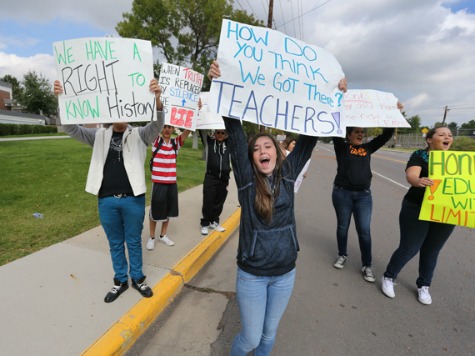While some schools in Jefferson County, Colorado, have had to close because of organized teacher “sickouts,” thousands of students in the district continue to protest, reportedly because they have been told that a member of the new reform-minded school board proposed a review of the new Advanced Placement U.S. History framework that has been published by the College Board, under the direction of David Coleman, the “architect” of the Common Core standards.
However, review of curriculum is the duty of the Jefferson County Board of Education, according to the Colorado Constitution and the board’s own district policies.
But what else are students saying about why they’re protesting, and where are they getting their information? Watch the video by JeffCoTruth.org:
These are some of the statements students made about why they’re protesting:
- The proposal said they would try to limit events in our history that have been examples of civil disobedience.
- They are going to change the whole curriculum.
- They want to get rid of the bad things that have happened in the past instead of telling us exactly what happened.
- Three of the main characters that have been in discussion have been to censor the movements that have occurred because of civil disobedience, so three of the names that have been thrown out have been Martin Luther King, Jr., Benjamin Franklin, and Thomas Jefferson.
- And the complete irony of this situation is that this nation was built upon people questioning authority.
In fact, Stanley Kurtz’s National Review Online review of the new APUSH framework finds the students have been grossly misled in what they believe about the new APUSH:
This Framework will effectively force American high schools to teach U.S. history from a leftist perspective. The College Board disclaims political intent, insisting that the new Framework provides a “balanced” guide that merely helps to streamline the AP U.S. History course while enhancing teacher flexibility. Not only the Framework itself, but the history of its development suggests that a balanced presentation of the American story was not the College Board’s goal.
“The goal is to ‘end American history as we have known it’ by substituting a more ‘transnational’ narrative for the traditional account,” writes Kurtz. “A willingness to use foreign law to interpret the U.S. Constitution is likewise encouraged.”
Kurtz also states that Fred Anderson, a Native Americans scholar, played a major role in the development of the new APUSH framework. He continues:
Anderson’s proposed new narrative of American history vacillates between ignoring core events of our political history and dismissing them as delusional window-dressing for America’s imperialist ambitions. He aims to show us ourselves through the eyes of our enemies, narrating the story of the Alamo, for example, through the eyes of Santa Anna, the Mexican commander who besieged and then executed its surviving defenders, with the goal of persuading us of the justice of the Mexican view.
Anderson explicitly rejects Lincoln’s framing of the American narrative. In Anderson’s view, the significance of the Founding has been overblown, whereas our encroachments on the Indians are the true paradigm of the American story. His purpose in shaping this new narrative is clearly to stir opposition to a forward-leaning defense of American interests abroad. He also hopes to dampen our ardor for American heroes like George Washington, Sam Houston, and Teddy Roosevelt.
It sounds like it’s the College Board and the new APUSH framework that are doing the censorship, not a JeffCo board committee that still does not exist.
Of what is the school board guilty? Ross Izard writing at The Complete Colorado said it best Monday:
In fairness, [board member Julie] Williams’ proposal contained some politically inflammatory language. Perhaps that’s why a near-immediate proposed amendment by John Newkirk (another of the “evil” majority members) struck that language from the document. In any case, the proposal was tabled and never voted on. That’s right, this [review] committee isn’t even a thing yet.
But what else are students saying about why they are protesting?
- And we want to make a note that while this is specifically about the U.S. history class, it’s also a lot about the previous changes they tried to make, because we want to protect our teachers, and we believe that they know best.
- That’s part of what this is about. Yes, it’s about the curriculum and what we do know, but it’s also about the frustrations that we don’t know about, and it’s about seeing the teachers … not getting what they believe they deserve, and we have full trust in their ability to gauge that.
- I mean, my freshman teacher, yesterday, when we were talking about it … he’s like, “You should all do it.” I think it’s because they’re mainly really upset because they’re not getting enough raises. …That’s…I don’t really know…that’s what I was told by my history teacher.
Remember the student who said the nation was built upon people questioning authority? Have these students questioned the authority of the information they were given by their teachers? Unlikely, if they believe “they know best.”
So what exactly is happening in Jefferson County, Colorado?
“Union leaders have found their moment to further escalate their political attacks against a school board that wants to give parents more power and to engage a broader community in making important decisions about what’s taught in the classroom,” Ben DeGrow, senior education policy analyst at the Independence Institute, told Breitbart News.
“At the national union meeting in July, the Colorado Education Association president cited Jeffco as one of three school districts where union locals are in ‘crisis,'” he continued. “The so-called crisis is the union losing its grip on the school districts in question, and desperation has apparently now driven union leadership to drag in students and close down schools in order to score political points and preserve power.”

COMMENTS
Please let us know if you're having issues with commenting.